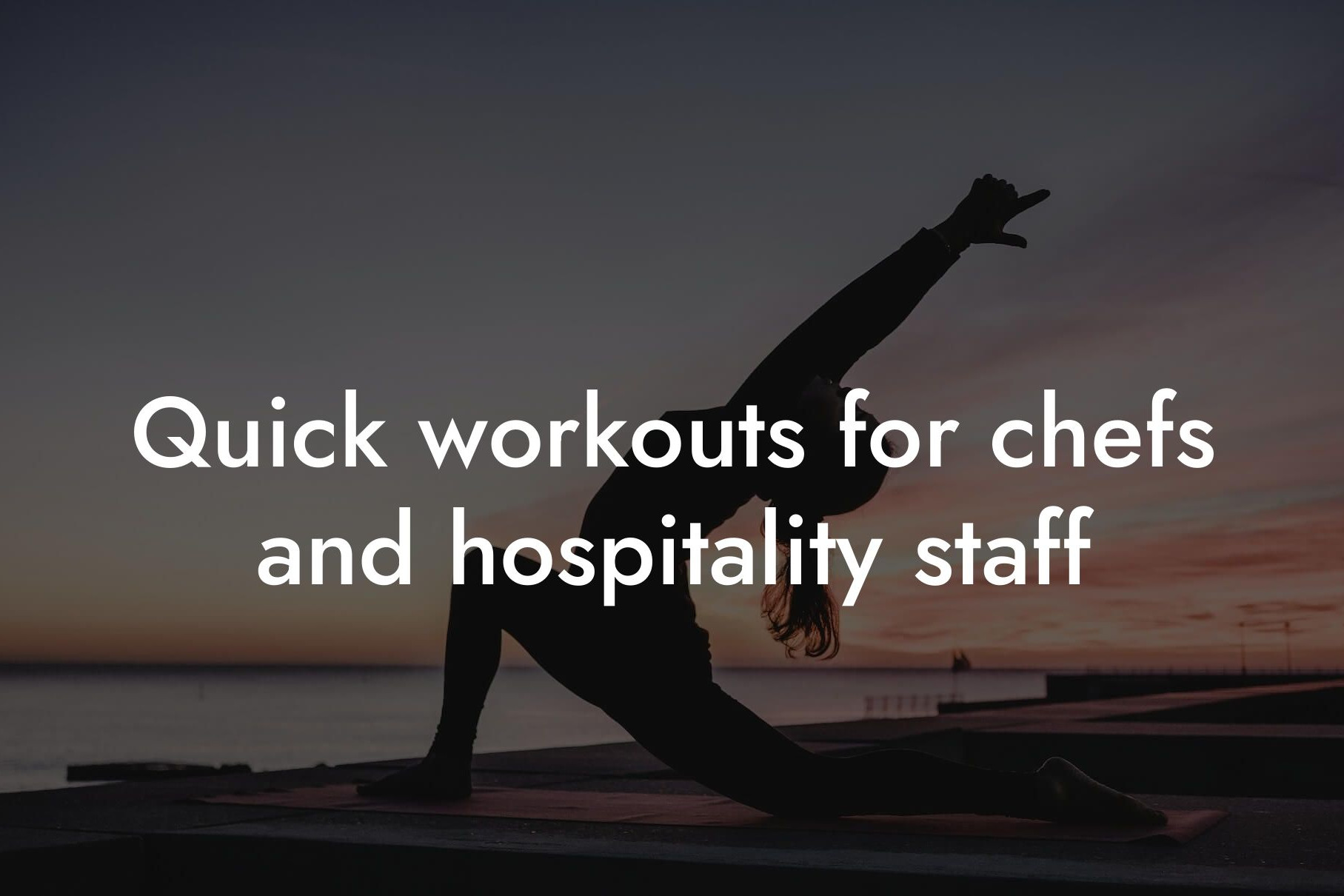The hospitality industry is known for its fast-paced and demanding environment, where long hours, high pressure, and constant customer interaction can take a toll on one's physical and mental well-being. As a high-earning professional in this industry, it's essential to prioritize stress management and fitness to maintain your overall health and performance. In this article, we'll delve into the challenges faced by hospitality professionals, the importance of stress management and fitness, and provide practical tips and strategies to help you thrive in this demanding industry.
Table of Contents
The Challenges of Working in Hospitality
Hospitality professionals often work long hours, including evenings, weekends, and holidays, which can disrupt their personal and family life. The physical demands of the job, such as standing for extended periods, lifting heavy objects, and working in a fast-paced environment, can also lead to fatigue, injury, and burnout. Additionally, the pressure to provide excellent customer service, manage staff, and meet business targets can cause significant stress and anxiety.
The Impact of Stress on Physical Health
Chronic stress can have severe consequences on physical health, including:
• Weakened immune system
• Digestive problems
• Sleep disturbances
• Cardiovascular disease
• Weight gain or loss
• Decreased bone density
As a hospitality professional, it's crucial to recognize the signs of stress and take proactive steps to manage it before it affects your physical health.
The Importance of Fitness in Hospitality
Regular exercise is essential for maintaining physical and mental well-being in the hospitality industry. Fitness can help:
• Increase energy levels and reduce fatigue
• Improve sleep quality
• Enhance mental clarity and focus
• Boost mood and reduce stress
• Improve overall physical health and reduce the risk of chronic diseases
Strategies for Managing Stress in Hospitality
To manage stress in the hospitality industry, try the following strategies:
• Prioritize self-care: Make time for activities that bring you joy and relaxation, such as reading, meditation, or spending time with loved ones.
• Set boundaries: Learn to say no to excessive workload or commitments that can interfere with your personal life.
• Take breaks: Take short breaks throughout the day to stretch, move around, and clear your mind.
• Communicate with your team: Share your workload and responsibilities with your colleagues to avoid burnout.
• Seek support: Talk to a supervisor, HR, or a mental health professional if you're struggling with stress or anxiety.
Fitness Tips for Hospitality Professionals
To maintain fitness in the hospitality industry, try the following tips:
• Schedule it in: Make exercise a non-negotiable part of your daily routine, even if it's just 20-30 minutes a day.
• Find activities you enjoy: Engage in physical activities that bring you joy, such as walking, jogging, yoga, or dancing.
• Make it convenient: Find ways to incorporate physical activity into your daily routine, such as taking the stairs instead of the elevator or doing a quick workout during your break.
• Focus on functional fitness: Incorporate exercises that improve your functional fitness, such as squats, lunges, and core exercises, to help you perform your job more efficiently.
Using DEXA Scans to Track Progress
As a hospitality professional, it's essential to track your progress and make data-driven decisions about your fitness and nutrition. A DEXA scan can provide you with a comprehensive body assessment, including:
• Body fat percentage
• Lean muscle mass
• Bone density
• Visceral fat
By tracking your progress with regular DEXA scans, you can:
• Identify areas for improvement
• Monitor the effectiveness of your fitness and nutrition plan
• Make adjustments to optimize your results
Managing stress and maintaining fitness are crucial for hospitality professionals who want to perform at their best and maintain their overall health. By recognizing the challenges of the industry, prioritizing self-care, and incorporating fitness and stress management strategies into your daily routine, you can thrive in this demanding industry. Remember to track your progress with regular DEXA scans and make data-driven decisions to optimize your results. With the right mindset and strategies, you can maintain your physical and mental well-being and achieve success in the hospitality industry.
Frequently Asked Questions
What are the common sources of stress in the hospitality industry?
The hospitality industry is known for its fast-paced and demanding environment, which can lead to high levels of stress. Common sources of stress in this industry include long working hours, high-pressure situations, difficult customers, tight deadlines, and lack of control over work schedules. Additionally, the physical demands of the job, such as lifting heavy objects, standing for long periods, and working in hot or noisy environments, can also contribute to stress.
How does stress affect physical fitness in the hospitality industry?
Chronic stress can have a significant impact on physical fitness in the hospitality industry. When we experience stress, our bodies release cortisol, a hormone that can lead to weight gain, fatigue, and decreased motivation. This can make it challenging to maintain a regular exercise routine, leading to decreased physical fitness. Furthermore, stress can also lead to poor eating habits, such as relying on convenience foods or overindulging in comfort foods, which can further exacerbate the problem.
What are some common physical health problems associated with stress in the hospitality industry?
Chronic stress in the hospitality industry has been linked to a range of physical health problems, including musculoskeletal disorders, cardiovascular disease, and gastrointestinal issues. Additionally, stress can also exacerbate existing health conditions, such as diabetes, hypertension, and anxiety disorders. It's essential for hospitality professionals to prioritize their physical health and take steps to manage stress effectively.
How can hospitality professionals prioritize their physical fitness despite a demanding work schedule?
Prioritizing physical fitness in the hospitality industry requires creativity and commitment. One strategy is to break up exercise into shorter, more manageable sessions, such as taking a 10-minute walk during breaks or doing a quick workout in a hotel room. Another approach is to schedule exercise into your daily routine, just as you would any other important appointment. Additionally, finding an exercise buddy or accountability partner can help provide motivation and support.
What are some effective stress-reduction techniques for hospitality professionals?
There are many effective stress-reduction techniques that hospitality professionals can use to manage stress. These include deep breathing exercises, meditation, yoga, and progressive muscle relaxation. Additionally, taking regular breaks, practicing gratitude, and engaging in hobbies or activities outside of work can also help reduce stress. It's essential to find what works best for you and make it a regular part of your routine.
How can hospitality professionals maintain a healthy diet despite long working hours and limited access to healthy food options?
Maintaining a healthy diet in the hospitality industry can be challenging, but it's not impossible. One strategy is to prepare healthy meals in advance and pack them in containers to take to work. Another approach is to seek out healthy food options, such as salads or grilled chicken, when eating out. Additionally, staying hydrated by drinking plenty of water and limiting sugary snacks can also help support overall health.
What are some common misconceptions about stress and physical fitness in the hospitality industry?
One common misconception is that stress is just part of the job and that there's nothing that can be done to manage it. Another misconception is that physical fitness is only for those with a lot of free time or who are naturally athletic. However, the truth is that everyone can benefit from stress-reduction techniques and physical activity, regardless of their schedule or fitness level.
How can hospitality professionals overcome the stigma associated with mental health and stress in the industry?
Overcoming the stigma associated with mental health and stress in the hospitality industry requires a cultural shift towards prioritizing employee well-being. This can involve educating employees about the importance of mental health, providing access to resources and support, and encouraging open and honest communication. Additionally, leaders and managers can set the tone by prioritizing their own mental health and well-being.
What role do employers play in supporting the physical fitness and mental well-being of hospitality professionals?
Employers play a critical role in supporting the physical fitness and mental well-being of hospitality professionals. This can involve providing access to wellness programs, fitness classes, or employee assistance programs. Additionally, employers can create a supportive work environment by promoting work-life balance, providing resources for stress management, and encouraging open communication.
How can hospitality professionals prioritize self-care despite a demanding work schedule?
Prioritizing self-care in the hospitality industry requires intention and commitment. One strategy is to schedule self-care activities, such as exercise or meditation, into your daily routine. Another approach is to prioritize sleep and aim for 7-8 hours of restful sleep per night. Additionally, taking breaks throughout the day to stretch, move your body, or practice deep breathing exercises can also help support overall well-being.
What are some effective ways to manage stress during peak periods in the hospitality industry?
Managing stress during peak periods in the hospitality industry requires advanced planning and preparation. One strategy is to prioritize tasks and focus on the most critical responsibilities. Another approach is to take regular breaks to rest and recharge. Additionally, communicating with colleagues and delegating tasks when possible can also help reduce stress.
How can hospitality professionals stay motivated to prioritize physical fitness and stress management?
Staying motivated to prioritize physical fitness and stress management in the hospitality industry requires setting clear goals and finding accountability. One strategy is to set specific, measurable goals, such as exercising three times per week or practicing meditation daily. Another approach is to find a workout buddy or accountability partner to provide support and motivation.
What are some common barriers to prioritizing physical fitness and stress management in the hospitality industry?
Common barriers to prioritizing physical fitness and stress management in the hospitality industry include lack of time, energy, or resources. Additionally, feelings of guilt or shame about taking time for oneself can also be a barrier. However, it's essential to recognize that prioritizing physical fitness and stress management is critical to overall well-being and can actually improve job performance and productivity.
How can hospitality professionals overcome feelings of guilt or shame about taking time for themselves?
Overcoming feelings of guilt or shame about taking time for oneself in the hospitality industry requires a shift in mindset. One strategy is to recognize that taking care of oneself is essential to providing excellent service to others. Another approach is to reframe self-care as a necessary investment in one's overall well-being, rather than a luxury or indulgence.
What are some effective ways to prioritize physical fitness and stress management during the off-season in the hospitality industry?
Prioritizing physical fitness and stress management during the off-season in the hospitality industry requires intention and commitment. One strategy is to use the downtime to focus on personal development and goal-setting. Another approach is to try new exercise routines or stress-reduction techniques, such as yoga or meditation. Additionally, taking advantage of employee wellness programs or fitness classes can also help support overall well-being.
How can hospitality professionals maintain a healthy work-life balance despite the demands of the industry?
Maintaining a healthy work-life balance in the hospitality industry requires clear boundaries and intentional prioritization. One strategy is to set clear boundaries around work hours and avoid checking work emails or taking work calls during personal time. Another approach is to prioritize self-care activities, such as exercise or meditation, and schedule them into your daily routine.
What are some effective ways to prioritize physical fitness and stress management during holidays and special events in the hospitality industry?
Prioritizing physical fitness and stress management during holidays and special events in the hospitality industry requires advanced planning and creativity. One strategy is to schedule exercise into your daily routine, even if it's just a short walk or stretching routine. Another approach is to prioritize healthy eating and avoid overindulging in holiday treats. Additionally, taking breaks to rest and recharge can also help reduce stress.
How can hospitality professionals prioritize their physical fitness and stress management despite limited access to resources or support?
Prioritizing physical fitness and stress management despite limited access to resources or support in the hospitality industry requires creativity and resourcefulness. One strategy is to find free or low-cost exercise options, such as bodyweight exercises or online workout videos. Another approach is to seek out support from colleagues or online communities. Additionally, prioritizing sleep and healthy eating can also help support overall well-being.
What are some effective ways to measure progress and track success in physical fitness and stress management in the hospitality industry?
Measuring progress and tracking success in physical fitness and stress management in the hospitality industry requires setting clear goals and tracking progress. One strategy is to set specific, measurable goals, such as exercising three times per week or practicing meditation daily. Another approach is to track progress through metrics, such as weight loss or improved sleep quality. Additionally, seeking feedback from colleagues or mentors can also help provide accountability and support.
How can hospitality professionals use technology to support their physical fitness and stress management goals?
Technology can be a powerful tool in supporting physical fitness and stress management goals in the hospitality industry. One strategy is to use fitness tracking apps or wearable devices to track progress and stay motivated. Another approach is to use meditation or mindfulness apps to guide stress-reduction techniques. Additionally, seeking out online resources or communities can also provide support and accountability.
What are some effective ways to prioritize physical fitness and stress management in the hospitality industry despite a lack of motivation or energy?
Prioritizing physical fitness and stress management in the hospitality industry despite a lack of motivation or energy requires finding ways to increase motivation and energy levels. One strategy is to find an exercise buddy or accountability partner to provide support and motivation. Another approach is to start small and set achievable goals, such as taking a 10-minute walk per day. Additionally, seeking out inspiration from others or finding a workout playlist can also help increase motivation.
Here are some related articles you might love...
- The impact of physical health on creativity in culinary arts
- How chefs can maintain fitness despite long hours in the kitchen
- Quick workouts for chefs and hospitality staff
- The connection between physical fitness and guest satisfaction
- Balancing food tasting with personal fitness goals
- The importance of DEXA scans for culinary and hospitality professionals
- Nutrition tips for maintaining energy during long service hours
- How hospitality professionals can stay active during busy shifts
- The role of physical fitness in preventing kitchen-related injuries
Zak Faulkner
Zak Faulkner is a leading authority in the realm of physical health and body composition analysis, with over 15 years of experience helping professionals optimise their fitness and well-being. As one the experts behind Tano Performance Group, Zak has dedicated his career to providing in-depth, science-backed insights that empower clients to elevate their physical performance and overall health.
With extensive knowledge of DEXA technology, Zak specializes in delivering comprehensive body assessments that offer precise data on body fat, muscle mass, bone density, and overall physique. His expertise enables individuals to make informed decisions and achieve their fitness goals with accuracy and confidence. Zak’s approach is rooted in a deep understanding of human physiology, combined with a passion for helping clients unlock their full potential through personalised strategies.
Over the years, Zak has earned a reputation for his commitment to excellence, precision, and client-focused service. His guidance is trusted by top professionals who demand the best when it comes to their health. Whether advising on fitness programs, nutritional strategies, or long-term wellness plans, Zak Faulkner’s insights are a valuable resource for anyone serious about taking their health and fitness to the next level.
At Tano Performance Group, Zak continues to lead our Content Team revolutionising how professionals approach their physical health, offering unparalleled expertise that drives real results.




